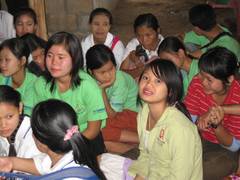BURMA: Peace-building Workshops Help Burmese Women
The stories coming from Burmese and ethnic minority women along the border with Thailand are difficult to listen to. A woman describes being gang-raped while pregnant. When she begged for mercy the first soldier raped her anyway “and slapped my face.” Then he threatened to harm her unborn baby. Then there were more soldiers, “one after another, up to four.”
A teenager recounts a night of violence against her and other girls. “There were many (attackers), and I remembered seven of them.”
Sexual violence, including rape, is being used as a weapon of war by the military bosses in Burma. Although the United Nations Security Council has condemned this type of violence, the Burmese perpetrators are yet to be prosecuted.
The Women's League of Burma, an umbrella organization working for women's rights, is calling for the UN to take action to stop the violence. A short video on their website documents some of the horrific stories through interviews with women who have suffered. The league has asked the UNSC to fulfill its obligation “to restore and maintain international peace and security,” so far to no avail.
The Primate's World Relief and Development Fund partners with the Women's League in providing workshops to help both men and women become aware of the violence and their rights to a safe life. “Women should not suffer in isolation,” says Mahjabeen Chowdhury, PWRDF's Asia-Pacific Program Coordinator.
PWRDF funding goes back to 2004, when the Asia-Pacific program did assessments of the human rights situation in Burma and the border areas. The funding goes to a program called “Women as Peace Builders.”'
Burma (called Myanmar by the regime) is a multi-ethnic country ruled by a military government since the 1960s. A pro-democracy movement began in 1988 when a large number of activists fled the country and continued from the border areas of Burma with their peaceful struggle for establishing democracy and peace in their country.
In 1999, 12 ethnic women's groups based in Burma's border areas in Thailand came together and formed a network organization called Women's League of Burma. The main goal of the network was to work collectively to advance women's strategic participation in the peace and democracy movement. It works for the empowerment of women and makes calls at local, national and international levels to eliminate discrimination and violence against women in Burma, including rape as weapon of war against women, Chowdhury explains.
PWRDF's support goes to organizing “Peace Builders” training workshops primarily to build the capacity of women to understand gender issues and systematic violence against them. The training is also to raise community awareness and develop understanding of the importance of addressing women's strategic needs for long lasting peace and democracy in Burma. Women and other community members who attend the training become trainers who then commit themselves to become lifelong advocates for peace and elimination of all forms of discrimination and violence against women.
PWRDF has provided funding to the Women's League of up to $30,000 a year; $20,000 was distributed in 2009.
And it's helping, says Chowdhury. “When I go and see those women,” she points out, “the level of awareness has gone up. When they speak out, they feel they have a voice. They are being heard. And that's very important to them.”
Photosource: Courtesy of Dare/NAN
PeaceWomen.org is a project of the Women's International League of Peace and Freedom, United Nations Office.
Fair Use Notice: This page contains copyrighted material the use of which has not been specifically authorized by the copyright owner.
PeaceWomen.org distributes this material without profit to those who have expressed a prior interest in receiving the included information for research and educational purposes.
We believe this constitutes a fair use of any such copyrighted material as provided for in 17 U.S.C § 107.
